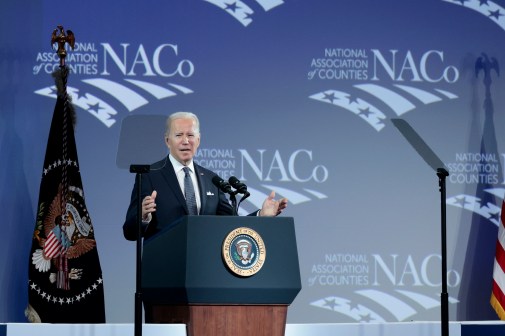Counties say IT spending remains a priority as budgets run dry

County officials from around the United States said Thursday that technology purchases helping their governments function remotely remain one of the most pressing investments, even as they stare into an abyss of depleted revenues brought on by the COVID-19 pandemic.
“We’ve had to increase bandwidth and computers to send people working from home,” Tim Bubb, a commissioner in Licking County, Ohio, said during a phone briefing hosted by the National Association of Counties.
Bubb said about two-thirds of the people who work for his county of about 176,000 residents are back in their offices as Ohio gradually relaxes its lockdown orders. But before the state’s March 23 stay-at-home order lifted Wednesday, there were significant costs to make sure county employees could work from home and that residents could access local services. Additional IT purchases, he said, “were certainly an appropriate place to spend money.”
“The [virtual private network] licenses, there is a cost to that, amping up your firewall,” he said. “We’re being productive, but there’s additional cost of working from home.”
Bubb did not give a specific figure of how much Licking County has spent on coronavirus-induced technology purchases. But he said the county, like state and local governments across the country, face a bleak financial future as the economic freeze zaps them of their tax bases. Bubb said Licking County, which was planning for an annual budget of $75 million, has already lost $3.2 million in revenue, and expects losses to go as high as $10 million for the duration of the health crisis.
“We haven’t gotten into furloughs at this point, but assessing the damage and figuring out where we’re going to be,” he said. “It seems like the longest year, and there’s still two-thirds to go.”
Meanwhile, state and local governments are begging the federal government for another round of aid to help them stave off budget cuts and layoffs. NACo Executive Director Matthew Chase said the $3 trillion relief bill the House approved last week — including nearly $1 trillion for states and localities — is a “great starting point,” but that final passage of any stimulus package is likely more than a month away, with Senate Majority Leader Mitch McConnell, R-Ky., not budging and the White House declaring the House’s bill “dead on arrival.”
“We’re unlikely to see anything before July 4,” Chase said. “We do need action today.”
Laura Curran, the executive of Nassau County, New York, which borders New York City and where more than 2,000 people have died of COVID-19, said her government is expecting its $3.1 billion budget take a $438 million hit.
“We’ve been hit hard,” she said.
But local governments have to continue spending to navigate the pandemic even as very little new money comes in.
“Technology is an investment we have to make at this time,” said Penny Postoak Ferguson, the manager of Johnson County, Kansas.
While Postoak Ferguson said her county, which includes suburbs of Kansas City, has reopened most of its facilities and brought about 80 percent of its workforce back to the office, the past few months have shown that remote work may be useful — and necessary — again in the future, and that investing in the necessary IT infrastructure will be crucial.
“Technology is an investment we have to make at this time,” she said. “Even after we get through our public health crisis and social distancing, it can be an efficient way to do a portion our business.”
Ferguson also said that federal funds that can be used on technology purchases may be as important as spending on medical masks and the other personal protective equipment that’s become a precious resource throughout the COVID-19 crisis.
“Anything that can be used for technology will be a priority almost as much as the PPE,” she said. “If you can invest now, it can have savings over time.”






